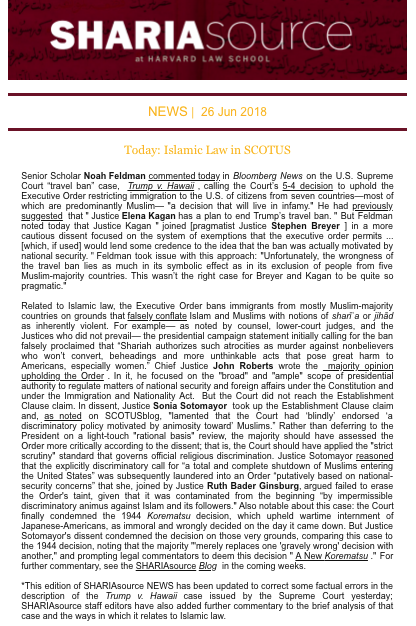
 Today: Islamic Law in SCOTUS Senior Scholar Noah Feldman commented today in Bloomberg News on the U.S. Supreme Court “travel ban” case, Trump v. Hawaii , calling the Court’s 5-4 decision to uphold the Executive Order restricting immigration to the U.S. of citizens from seven countries—most of which are predominantly Muslim— “a decision that will live in infamy.” He had previously suggested that ” Justice Elena Kagan has a plan to end Trump’s travel ban. ” But Feldman noted today that Justice Kagan ” joined [pragmatist Justice Stephen Breyer ] in a more cautious dissent focused on the system of exemptions that the executive order permits … [which, if used] would lend some credence to the idea that the ban was actually motivated by national security. ” Feldman took issue with this approach: “Unfortunately, the wrongness of the travel ban lies as much in its symbolic effect as in its exclusion of people from five Muslim-majority countries. This wasn’t the right case for Breyer and Kagan to be quite so pragmatic.” Related to Islamic law, the Executive Order bans immigrants from mostly Muslim-majority countries on grounds that falsely conflate Islam and Muslims with notions of sharīʿa or jihād as inherently violent. For example— as noted by counsel, lower-court judges, and the Justices who did not prevail— the presidential campaign statement initially calling for the ban falsely proclaimed that “Shariah authorizes such atrocities as murder against non believers who won’t convert, beheadings and more unthinkable acts that pose great harm to Americans, especially women.” Chief Justice John Roberts wrote the majority opinion upholding the Order . In it, he focused on the “broad” and “ample” scope of presidential authority to regulate matters of national security and foreign affairs under the Constitution and under the Immigration and Nationality Act. But the Court did not reach the Establishment Clause claim. Image credit: Wikipedia
Today: Islamic Law in SCOTUS Senior Scholar Noah Feldman commented today in Bloomberg News on the U.S. Supreme Court “travel ban” case, Trump v. Hawaii , calling the Court’s 5-4 decision to uphold the Executive Order restricting immigration to the U.S. of citizens from seven countries—most of which are predominantly Muslim— “a decision that will live in infamy.” He had previously suggested that ” Justice Elena Kagan has a plan to end Trump’s travel ban. ” But Feldman noted today that Justice Kagan ” joined [pragmatist Justice Stephen Breyer ] in a more cautious dissent focused on the system of exemptions that the executive order permits … [which, if used] would lend some credence to the idea that the ban was actually motivated by national security. ” Feldman took issue with this approach: “Unfortunately, the wrongness of the travel ban lies as much in its symbolic effect as in its exclusion of people from five Muslim-majority countries. This wasn’t the right case for Breyer and Kagan to be quite so pragmatic.” Related to Islamic law, the Executive Order bans immigrants from mostly Muslim-majority countries on grounds that falsely conflate Islam and Muslims with notions of sharīʿa or jihād as inherently violent. For example— as noted by counsel, lower-court judges, and the Justices who did not prevail— the presidential campaign statement initially calling for the ban falsely proclaimed that “Shariah authorizes such atrocities as murder against non believers who won’t convert, beheadings and more unthinkable acts that pose great harm to Americans, especially women.” Chief Justice John Roberts wrote the majority opinion upholding the Order . In it, he focused on the “broad” and “ample” scope of presidential authority to regulate matters of national security and foreign affairs under the Constitution and under the Immigration and Nationality Act. But the Court did not reach the Establishment Clause claim. Image credit: Wikipedia
 Spotlight on Ismāʿīlī Law: A Case Study of Family Law Jurisdiction in Kenya This month, student editor Aleema Jamal places the spotlight on otherwise often elusive Ismāʿīlī law as it operates in modern courts. The Aga Khan, leader of the Ismā ͑īlī community— who refer to themselves in full as Shī ͑ī Imāmī Ismāʿīlī Muslims— sought to unify his followers under an Ismāʿīlī Constitution in 1986. The Constitution laid out a dispute resolution system that was meant to create a sense of community identity and ethos for a group dispersed across different states, even though it did not preclude the practice of state law on citizens of those various states. Two divorce cases in Kenya, Nurani v. Nurani in 1982 and TSJ v. SHSR in 2014 illuminated whether and how that goal operated in practice. According to Jamal, for the dispute resolution system to be effective internally, it had to be “subservient to, and reliant upon its relationship with the modern nation-state.” Initially, the Nairobi Court of Appeal recognized and legitimized the Ismāʿīlī Constitution’s dispute resolution systems by providing a high degree of deference to the Ismāʿīlī Arbitration Council in the country’s Kadhi courts. But by 2014, the Nairobi High Court determined that the Ismāʿīlī Council could only deal with matters ‘not within the exclusive jurisdiction of either the ordinary courts or the Kadhis’ …courts.'” Read more. Image credit: Wikipedia
Spotlight on Ismāʿīlī Law: A Case Study of Family Law Jurisdiction in Kenya This month, student editor Aleema Jamal places the spotlight on otherwise often elusive Ismāʿīlī law as it operates in modern courts. The Aga Khan, leader of the Ismā ͑īlī community— who refer to themselves in full as Shī ͑ī Imāmī Ismāʿīlī Muslims— sought to unify his followers under an Ismāʿīlī Constitution in 1986. The Constitution laid out a dispute resolution system that was meant to create a sense of community identity and ethos for a group dispersed across different states, even though it did not preclude the practice of state law on citizens of those various states. Two divorce cases in Kenya, Nurani v. Nurani in 1982 and TSJ v. SHSR in 2014 illuminated whether and how that goal operated in practice. According to Jamal, for the dispute resolution system to be effective internally, it had to be “subservient to, and reliant upon its relationship with the modern nation-state.” Initially, the Nairobi Court of Appeal recognized and legitimized the Ismāʿīlī Constitution’s dispute resolution systems by providing a high degree of deference to the Ismāʿīlī Arbitration Council in the country’s Kadhi courts. But by 2014, the Nairobi High Court determined that the Ismāʿīlī Council could only deal with matters ‘not within the exclusive jurisdiction of either the ordinary courts or the Kadhis’ …courts.'” Read more. Image credit: Wikipedia
 Nurani v. Nurani (Nairobi Court of Appeal): Kenyan Ismāʿīlī Divorce Case of 1982 The Nairobi Court of Appeal adjudicated Nurani v. Nurani in 1982, a divorce case involving Ismāʿīlī parties seeking to separate. The Court held that it had concurrent jurisdiction with the Ismaili Conciliation and Arbitration Board for Kenya—deemed a “sectarian tribunal”— when, as here, both husband and wife submitted to its jurisdiction. Accordingly, the Court issued a decision on issues arising from the couple’s divorce. The Court also clarified the role of the sectarian tribunal as a part of Kenya’s pluralist legal system. Read more. Image credit: Wikipedia
Nurani v. Nurani (Nairobi Court of Appeal): Kenyan Ismāʿīlī Divorce Case of 1982 The Nairobi Court of Appeal adjudicated Nurani v. Nurani in 1982, a divorce case involving Ismāʿīlī parties seeking to separate. The Court held that it had concurrent jurisdiction with the Ismaili Conciliation and Arbitration Board for Kenya—deemed a “sectarian tribunal”— when, as here, both husband and wife submitted to its jurisdiction. Accordingly, the Court issued a decision on issues arising from the couple’s divorce. The Court also clarified the role of the sectarian tribunal as a part of Kenya’s pluralist legal system. Read more. Image credit: Wikipedia
 TSJ v. SHSR (Nairobi High Court): Kenyan Ismāʿīlī Divorce Case of 2014 In TSJ v. SHSR , the Nairobi High Court concluded that the Ismaili Conciliation and Arbitration Board for Kenya lacked the jurisdiction to adjudicate a matter of divorce despite the fact that both husband and wife had initially submitted to its jurisdiction. Reversing a 1982 precedent laid out in Nurani v. Nurani , the Court rolled back the jurisdiction of “sectarian tribunals” and determined that only either ordinary courts or Kadhi Courts could have exclusive jurisdiction on such matters. Read more. Image credit: Capital News of Kenya
TSJ v. SHSR (Nairobi High Court): Kenyan Ismāʿīlī Divorce Case of 2014 In TSJ v. SHSR , the Nairobi High Court concluded that the Ismaili Conciliation and Arbitration Board for Kenya lacked the jurisdiction to adjudicate a matter of divorce despite the fact that both husband and wife had initially submitted to its jurisdiction. Reversing a 1982 precedent laid out in Nurani v. Nurani , the Court rolled back the jurisdiction of “sectarian tribunals” and determined that only either ordinary courts or Kadhi Courts could have exclusive jurisdiction on such matters. Read more. Image credit: Capital News of Kenya
See the full newsletter.

